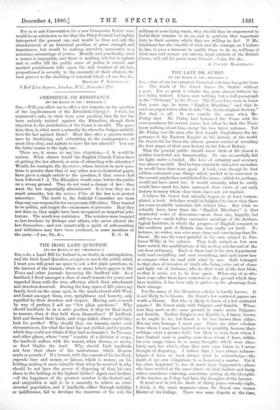THE IRISH LAND QUESTION.
go THE EDITOR OF THE " EPECTATOR.".1
SIR,—As a Land Bill for Ireland is, no doubt, in contemplation, and the Irish Land Question occupies so much the public mind, I trust you will grant me space to ask a few plain questions, in the interest of the tenants, when so many letters appear in the Times and other journals favouring the landlord side. As a landlord, I lived amongst a class of small tenants for years, and regarded them with the true affection which their attachment and devotion deserved. During the long space of 225 years, my family lived on the same spot, in the much-abused wild West, and found amongst them, ever, uprightness and honesty, only equalled by their devotion and respect. Having said so much by way of preface, I ask my "few plain questions." Why should landlords be in a safer position if they let their lands to tenants, than if they held them themselves P If landlords held and farmed their lands, and crops failed, where could they look for profits? Why should they sue tenants, under such circumstances, for what the land has not yielded, and for profits which they could not obtain if they had no tenants? In Tuscany and other places, where " rent " consists of a division of crops, the landlord suffers with the tenant, when disease, or storm, or flood blights the land. Why should Irish landlords not bear their share of the misfortunes which Heaven sends or permits P If a tenant, with the consent of his landlord, expends time and money, or labour, which is money, on his holding, making it more valuable than when he received it, why should he not have the power of disposing of that, his own share in the holding, to the highest bidder P Again and farther, —if the happiness of the greatest number is the desired end, and emigration is said to be a necessity to relieve an over- crowded population, and if landlords, either through inability or indifference, fail to develope the resources of the soil, the millions of acres lying waste, why should they be empowered to forbid their tenants to do so, and to perform that important duty to their country which they are willing to do ? If Mr. Gladstone has the breadth of view and the courage, as I believe he has, to pass a measure to enable them to do so, millions of Irish men and Women yet unborn, loyal subjects of the British Crown, will call his great name blessed.—I am, Sir, &c., A COUNTY MAGISTRATE.






































 Previous page
Previous page